Parking As Residential Incentive: Where?
About 40 monthly parking permits in Ann Arbor’s public parking system – to be sold to a proposed project at 624 Church St. – have been the topic of discussion by the Ann Arbor Downtown Development Authority in the last few months.
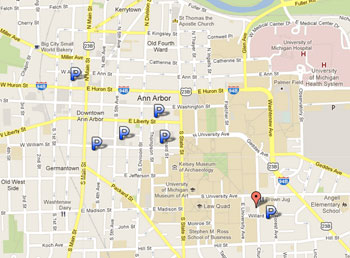
The location of the 624 Church St. project is indicated with a red pushpin. Locations of structures in Ann Arbor’s public parking system are indicated with blue Ps.
Most recently, at the Dec. 19 meeting of the DDA’s operations committee, the discussion focused on location: For which of the six public parking structures would monthly permits be sold? The developer of the 624 Church St. project would prefer that the project be allowed to buy permits in the Forest parking structure.
The Forest facility, a joint venture of the DDA and the University of Michigan, is the structure closest to the proposed residential development. According to the developer’s Nov. 28 submittal to the city, the 13-story project would include more than 80,000 square feet of new floor area with the following configuration of apartments: 11 one-bedroom; 21 two-bedroom; 33 three-bedroom; and 11 four-bedroom units. That’s a total of 76 apartments, with 196 bedrooms.
The developer, Opus Development Corp., has already won approval from the DDA’s board to satisfy the project’s parking requirement without providing onsite spaces – by instead using the contribution in lieu (CIL) program. The CIL provides an option to purchase monthly permits, but the cost is at a rate 20% higher than standard pricing.
Discussion by the DDA operations committee on Dec. 19 centered around the issue of fairness: Would allowing the purchase of permits in the Forest structure give the developer of the 624 Church St. project an unfair competitive advantage in the South University area rental market? Raising the fairness issue was DDA board member Roger Hewitt, who owns Revive + Replenish, which is a tenant in the ground floor of the Zaragon Place on East University. Zaragon is a nine-story apartment building with almost 250 bedrooms, catering to the student rental market.
Other board members did not perceive the issue to be problematic, from the perspective of fairness to already-existing projects. And Susan Pollay, executive director of the DDA, pointed out that the decision to allow a project to purchase monthly parking permits is a tool that’s available to the DDA to help make a private development possible that otherwise would not be. In the case of 624 Church St., building parking spaces on that site isn’t feasible. Hewitt was concerned that the strategy – if the DDA allowed permits to be purchased at a structure very near to projects – might result in an incentive for developers in the future not to build any onsite parking.
The committee’s discussion was inconclusive, but committee members indicated they wanted to develop a formal policy on which parking structures would be chosen for monthly permits sold under the CIL program. The 624 Church St. project is due to come before the city planning commission on Jan. 15, so the developer would prefer to have the issue settled by then. But given the DDA’s desire first to establish a policy that would guide this and future decisions, it’s unlikely it will be finalized as early as mid-January.
Based on the committee’s discussion, capacity in the parking system does not appear currently to be a limiting factor on selling CIL permits. The committee also reviewed the latest monthly parking data, which shows continued increased usage of the new underground garage, Library Lane.
Revenues per space in the Library Lane structure are now beginning to approach those of on-street parking spaces, but are still the lowest of any facility in the system. That’s due in part to a discounted rate offered to induce holders of permits in other structures to move to Library Lane.
Also of interest at the operations committee meeting was a draft policy for holding events on top of the Library Lane structure, including the closure of the mid-block cut-through, Library Lane itself.
624 Church: Additional Background on CIL
The D1 zoning for the 624 Church St. project doesn’t actually include any parking requirements – as long as the total floor area does not exceed 400% FAR (floor area ratio). But as proposed, the project comes in at 665% FAR. And to get the extra 265% FAR as a by-right premium, the city’s requirement of 1 parking space for each 1,000 square feet of additional floor area works out to 40 parking spaces.
The DDA board had already voted, on Oct. 3, 2012, to authorize the parking spaces – somewhere in the system. It’s the first time the policy has been applied. It’s not the same mechanism that was used to provide Google an incentive to locate some of its offices in downtown Ann Arbor. Parking spaces were offered to Google on a subsidized basis. What’s at issue for 624 Church St. is the ability to purchase monthly permits by paying a premium rate.
A mechanism for new developments in downtown Ann Arbor to meet minimum parking requirements – without providing onsite spaces – has been part of the city’s downtown planning and development policy for a little more than three years. The city council adopted new zoning for the downtown on Nov. 18, 2009.
And the Ann Arbor DDA, which operates the public parking system under contract with the city, had approved its recommendation of a specific CIL policy more than two years ago, at its July 7, 2010 board meeting.
The city council then formally adopted the DDA’s recommended policy, at its April 2, 2012 meeting, with the policy’s two options: (1) purchase monthly parking permits in the public parking system for an extra 20% of the current rate for such permits, with a commitment of 15 years; or (2) make a lump sum payment of $55,000 per space. It’s option (1) that the 624 Church St. project is exercising.
Current standard pricing of permits at Forest is $145 a month. At the CIL rate, the cost would be $174 a month.
624 Church: Committee Discussion on Location
Roger Hewitt raised two issues of concern to him – fairness and the unintended consequence of giving an incentive to developers not to provide onsite parking spaces. He also felt there could potentially be a legal liability for the DDA.
On the fairness question, Susan Pollay – executive director of the DDA – indicated that the kind of judgments involved were already being made in the context of the DDA’s regular monthly parking permits program. She wondered what the legal liability could be. Hewitt responded by saying that if a developer spends millions of extra dollars to add parking spaces to a project, and a different developer in the future simply asks the DDA to purchase monthly permits, the project that’s been granted the right to satisfy parking requirements by purchasing permits could become a more profitable project.
Hewitt feared the DDA would be incentivizing developers not to build onsite parking spaces. So he floated the idea that if N spaces were required, then only some percentage of N would be provided in a structure located close to the project. For example, he said, if the project needs 40 spaces, then perhaps 10% – or four spaces – would be provided in a location close to the project, with the rest provided elsewhere in the system.
Pollay again questioned whether there was any actual legal liability. DDA board member Joan Lowenstein, an attorney, indicated she didn’t think there was a legal problem – and the matter of fairness was one that’s to be addressed through an administrative process.
Hewitt reiterated his position – he was worried that in the future, because of the availability of the monthly permit options, “nobody builds parking.” DDA board member John Splitt ventured that it’s not completely clear whether a project that satisfies its parking requirement through the purchase of monthly permits would be more profitable than one that builds onsite spaces. He said the DDA doesn’t know what the return on the investment for a private developer is – one who charges residents for the use of an onsite parking space – to build those spaces. Hewitt ventured that the return is less than building “student dorm space.”
Pollay noted that the DDA was established to encourage new development, to increase TIF (tax increment financing), and that the contribution in lieu (CIL) of parking is specifically designed to encourage residential development. She stated that the only way the 624 Church St. project could be built – due to constraints of the site configuration – is if the CIL program were available.
DDA board member Leah Gunn noted that the only open question is the location of the monthly permits – because the board had already voted to allow 624 Church St. to purchase monthly permits somewhere in the system. She wondered if it were possible to sell some of the permits in the Forest structure and some elsewhere.
The conversation circled back to the question of fairness. Pollay asked if Hewitt was worried about fairness with respect to future projects or current projects? Hewitt seemed to indicate that fairness would dictate that existing projects should also have the option to obtain permits under the CIL program. Pollay stated that projects like Landmark and Zaragon Place are already built – so she didn’t see it as a fairness problem.
Landmark and Zaragon have onsite parking spaces, and those developments are renting the spaces to their tenants, Pollay noted. So Pollay said it seemed to her like those projects built parking spaces onsite because they chose to. Lowenstein ventured that it’s a competitive market, so the availability of onsite parking could be an advantage.
On the issue of fairness, Gunn asked if it was fair for Google’s parking permits to be subsidized initially, but not the parking spaces for Barracuda Networks. She allowed that employees of Barracuda are still getting a deal, because of the discount that the DDA has applied (for anyone, not just for Barracuda) to the cost of permits in the new underground Library Lane structure.
Gunn came back to her point that the DDA had already determined that the public parking system had adequate capacity to sell 40 permits to the 624 Church St. project. The only question is where, she said. Responding to concerns voiced again by Hewitt, Splitt suggested that the question of location could require “a bit more of a deeper dive.” Splitt didn’t want the choice of location for the permits to translate into a disincentive to construct onsite parking spaces.
Pollay suggested putting off a decision and asking city planning staff for their input. She suggested forming a subcommittee. Gunn wanted clarification: Would the subcommittee focus just on the 40 permits for 624 Church St.? Hewitt stated that the subcommittee should work on a general policy on location, saying, “We need a policy to defend in public.” Splitt wondered if it might not be possible to approve the 40 spaces for 624 Church St. in a particular location without the general policy. Pollay suggested that it might be worth hearing from the DDA’s legal counsel.
Local attorney Scott Munzel, who represents the developer, attended the operations committee meeting. He told committee members that it was an interesting conversation. He felt that developers prefer to build parking spaces on site, if they can, and suspected they make money on those spaces. He felt that allowing the purchase of monthly permits in a nearby structure would not be a disincentive to build spaces on site. He pointed out that the CIL program requires the payment of a premium – 20% more than the prevailing standard cost. That 20% was not huge, he allowed, but it’s real.
Munzel suggested an approach where the DDA could agree to sell 40 permits now in the Forest structure, but reserve the right “to boot them out” to a different structure in the future. That might be a way to make people feel more comfortable, he ventured.
A question from DDA board member Keith Orr drew out the fact that the parking permit contract under the CIL program was for 15 years. Pollay indicated that the idea was that in 15 years, it was hoped that the transit system of the future would be so robust that parking requirements for new developments would be zero.
Gunn then asked Joe Morehouse, deputy director of the DDA, where he’d choose to sell the permits. Economically, Morehouse said, it would be better to sell the permits for the Forest structure – compared to the Maynard and Liberty Square structures. The $29 added to the $145 for a standard monthly permit at Forest would yield more in a year than hourly parking typically does at Forest, he said. But the location where the permits would benefit the system most would be at Fourth and William, he said.
By way of additional background, there are currently 101 monthly permits for the Forest structure assigned by the DDA. But the University of Michigan has access to one-third of the 854 spaces there. UM affiliates with an appropriate parking pass can enter the structure until the one-third limit is reached.
Munzel noted that the city planning commission would have the 624 Church St. project on its agenda on Jan. 15, 2013. The parking requirement, met through the CIL program, would be part of the development agreement, which will be part of the site plan approval process, he noted. Munzel felt that Opus Development Corp. wouldn’t necessarily “have heartburn” if the location was not settled by the Jan. 15 planning commission meeting. Munzel felt it wouldn’t be a problem to say, “The DDA is still considering it.” It would, however, be easier to say, “This is what’s been decided,” Munzel said. It would need to be decided by the time a final approval is given by the city council, he said.
Varsity: Also Asking for CIL
At the Dec. 19 meeting of the DDA operations committee, it was noted that the Varsity development is also looking for four monthly permits under the CIL program. The project, located on East Washington Street, is a 13-story, 173-unit, 178,380-square-foot apartment building for approximately 418 persons with 77 parking spaces. Construction on the project is well underway.
Roger Hewitt’s reaction to the news that the Varsity was requesting four CIL spaces was: “How’d they get almost done and then find out they needed spaces?” Amber Miller, the DDA’s planning specialist, explained that the Varsity thought it had a viable agreement with Zipcar to contract for spaces, to satisfy part of the parking requirement.
In response to an emailed query, Ann Arbor city planning manager Wendy Rampson essentially confirmed that understanding, writing that the Varsity had proposed to locate two car share spaces (Zipcar) in a surface parking lot on the property it owns west of the Varsity. One car share space is equal to four required parking spaces.
That would add eight spaces to the total provided by the Varsity, even though the Varsity only needs to provide an additional six spaces. Rampson believed that because the Varsity was not able to reach an agreement with Zipcar, the developer is now requesting four monthly permits from the DDA under the CIL program. The four permits, with the two spaces on the west parcel, add up to the six additional spaces that the Varsity needs to fulfill its additional parking requirement.
Monthly Parking Data
At its Dec. 19 meeting, the DDA operations committee received the regular report of parking revenues broken down by facility. At the Dec. 5, 2012 meeting of the full board, DDA board member Roger Hewitt indicated that the format of monthly parking reports would be changed to include more detailed data. That change has not yet been implemented. Currently, the DDA uses revenue and total numbers of hourly patrons as an imperfect proxy to gauge use of the system.
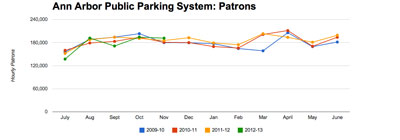
Ann Arbor public parking system: Hourly patrons in November 2012 (green trend line) showed a slight increase over November 2011, after showing a four-year low in September and mid-range numbers in October, compared to the last three years. Compared to last year, the number of parking spaces in the system has increased from 6,995 to 7,806, mostly due to the construction of the Library Lane structure, with its 700+ spaces.
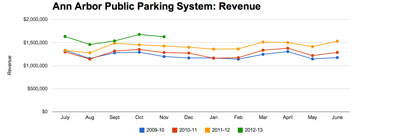
Ann Arbor public parking system: Revenue continues to show higher levels than last year in the same month – due at least in part to higher rates, hourly billing instead of half-hourly, and around 800 additional spaces in the system compared to last year. Revenues from October to November this year showed a slight downward trend, as they have in each of the last three years.
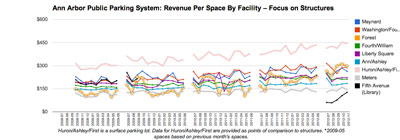
Ann Arbor public parking system: Revenue per space in structures. The Forest structure (yellow trend line) is historically somewhat volatile, as it’s subject to the rhythms of the University of Michigan academic schedule. That’s the structure where the 624 Church St. project would like to purchase 40 monthly parking permits, instead of building the spaces on site. Library Lane (black trend line) showed continued increases in usage, with revenues per space approaching those of the on-street parking spaces (gray trend line).
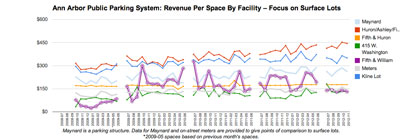
Ann Arbor public parking system: Revenues per space in surface lots. Revenues at the old Y lot at Fifth and William (purple trend line) reflect the onset of Library Lane construction, which removed the surface parking there, and later, the opening of the new Library Lane parking structure.
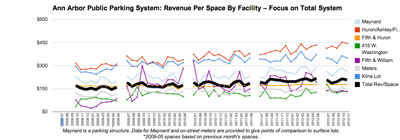
Ann Arbor public parking system: Revenues per space. Systemwide (heavy black trend line) the system showed a slight decline from October to November in revenues per space, as it has in past years.
Events on Top of Library Lane
At its Dec. 19 meeting, the operations committee was also provided with a draft of ideas for a policy on special events at the Library Lane mid-block cut-through and the top of the Library Lane parking garage.
The preamble to the draft includes the expectation that the site would eventually include a building with public open space:
The structural component of the underground Library Lane structure was designed to anticipate the construction of a future building and a future public open space area. In the meanwhile, until such time as these elements are designed and constructed, the DDA is supportive of community groups using the Library Lane surface parking lot and the adjoining Library Lane for events, public gatherings and meetings.
In the draft, the main bureaucratic requirement is approval by the city of Ann Arbor for a special events permit, which currently costs $34. There would also be an insurance requirement and the need to agree in advance to pay for any damages. Event organizers would not be allowed to drive stakes into the surface of the site. Trash is required to be removed from the site after an event. No water is available, and the use of power generators would not be allowed.
In some of the smattering of conversation on the issue, DDA board member Keith Orr ventured that he thought it’d be interesting to see a Bottom of the Park-type event, hosted on the lowest level of the underground garage – a play on the name of the Ann Arbor Summer Festival‘s “Top of the Park.”
The Chronicle could not survive without regular voluntary subscriptions to support our coverage of public bodies like the Ann Arbor Downtown Development Authority. Click this link for details: Subscribe to The Chronicle. And if you’re already supporting us, please encourage your friends, neighbors and colleagues to help support The Chronicle, too!



